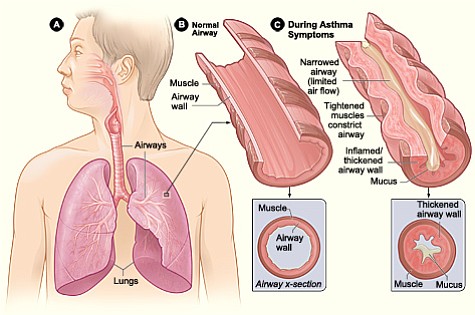Yoga therapy and Asthma
Searching for interesting articles regarding respiratory diseases, this article from Turkey caught my eye regarding the effect of yoga on respiratory functions, symptom control and life quality of asthma patients. Various studies are known about asthma and the effect of yoga, however in Turkey no studies conducted with yoga have been found on asthma patients specifically. For this reason, the authors conducted this study with the aim to prove the effect of yoga practices in preventing and controlling symptoms of asthma patients and to contribute to nursing literature. Their study hypothesis were:
- H0. Yoga does not improve breathing function, symptom control and quality of life
- H1. Yoga improves the respiratory function of asthma patients
- H2. Yoga improves symptom control in asthma patients
- H3. Yoga improves the quality of life of asthma patients

Asthma is one of the major non communicable and chronic diseases of the air passages of the lungs which inflames and narrows them. During an asthma attack, also called an asthma exacerbation, the airways become swollen and inflamed. The muscles around the airways contract and the airways produce extra mucus, causing the breathing (bronchial) tubes to narrow. During an attack, a person may cough, wheeze and have trouble breathing. Unfortunately, it is a common disease among children.
Before we deep dive into the article, I’ve looked at some facts and figures about this respiratory disease. WHO has some nice fact sheets about various diseases, including asthma. I was a bit surprised that 339 million people had Asthma globally in 2016. Moreover, the prognosis that 400 million people will have asthma in 2025 actually shocked me a little. What is the reason for this increase? Can we all develop asthma in the long run? If so, what are the strongest risk factors, and can we prevent this? Is it a reversible disease? Are there genetic factors that make someone more prone to develop asthma? All kinds of questions simultaneously popped into my mind.
Fact is that the strongest risk factors for developing asthma are inhaled substances and particles that may provoke allergic reactions or irritate the airways. Does this imply that we are on the verge of developing chronic respiratory diseases, due to increasing air pollution?
Ok, let’s not panic and first look at some other facts. Yes, we can all develop asthma in the long run, however some of us have a higher risk factor than others. As mentioned before, air pollution is a risk factor, but also, genetics, i.e., if you have a parent with asthma, you are three to six times more likely to develop asthma. Furthermore, allergies like eczema and hay fever, smoking, and children and adults who are overweight or obese are at a greater risk of developing asthma.
Quite a list, I might say. And I’m not even going to go for the things that might trigger an asthma attack (which is approximately anything you can think of, e.g., vigorous exercise, climate change, stress, environmental pollutants, respiratory infection, allergic reaction, even certain medication. It is very personal what is/ are your trigger(s)). So, to summarize, working with a person who suffers from asthma is delicate work. Good news is, that medication can control asthma, and avoiding triggers can also reduce the severity of asthma.






